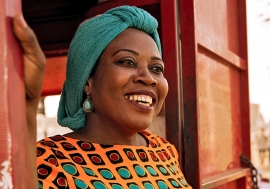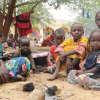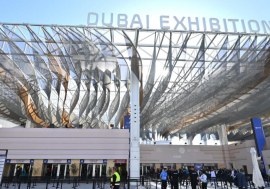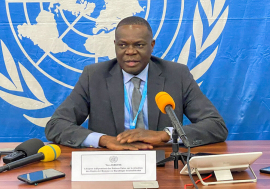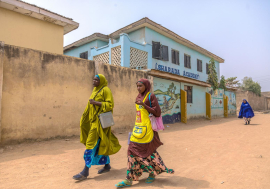African countries are yet to see the light at the end of the tunnel of the COVID-19 crisis, but they must quickly initiate deep economic reforms to prepare for their future as returning to their pre-pandemic model is no longer impossible.
While the pandemic has generated an urgent need for increased international support for Africa within the framework of a more modern form of multilateralism, the region will have to take charge of its own future by building a new kind of partnership with the private sector - both at the national and international level - so as to secure the financing needed for their economic recovery and mitigate the medium and long-term impact of the crisis.
These were the main takeaways of the high-level roundtable "The Big Debate: Was the multilateral system prepared for the COVID-19 crisis and did the private sector do enough?" held during the ministerial segment of the Fifty-third session of the Conference of African Ministers of Finance, Planning and Economic Development on March 22nd, 2021.
Access to COVID-19 vaccines
In the developed world, the launch of vaccination campaigns and the first positive results of the economic crisis mitigation measures have given countries a significant head start in the race for adaptation to the new post-COVID-19 economic context.
However, Africa, which is at the back of the queue regarding access to vaccines, and which has sorely lacked funding to mitigate the impact of the health crisis on its economies, is far from the end of her ordeal.
To curb the spread of the pandemic all countries have adopted protection measures, which have resulted in de-facto return to protectionism. This has led to persistent uncertainty, despite the arrival of vaccines, and now, we are talking about second and third waves and the appearance of new COVID-19 variants, said Gabon’s Minister of Economy and Recovery, Nicole Roboty.
This situation could have significant medium and long-term implications on Africa’s development, and a very real impact on the rest of the world, leading experts to call for an increased support to Africa, according to IMF Director for Africa, Abebe Aemro Selassie.
“I think the region is going to face quite a difficult few years. What will be happening over the next 5 - 8 years in Africa is in the deep interests of the international community. The demographic transition unfolding in the region means that at least demographically - but also in my view economically - the 21st century is the African century,” he added.
Mr. Selassie lauded the G7 countries’ recent decision to grand new Special Drawing Rights (SDR) for the benefit of developing countries and those vulnerable to COVID-19, a measure that should benefit middle-income countries such as Gabon.
However, here again, international support for Africa can no longer be based on the same model as in the past as it will have to take place within the framework of a new, post-COVID-19 type of multilateralism, and help increase the region’s capacity to navigate future crises.
“The first thing we need to recognize is that the crisis we are facing now is not going to be the final one. The current multilateral system was designed in the mid-20th century, as we all know, and reality has changed in a fundamental way since”, said Arkebe Oqubay, Senior Minister and Special Adviser to the Prime Minister of Ethiopia, and Africa’s candidate for UNIDO Director General.
What Africa needs is a more predictable decade ahead of it, a unified global and regional response, and a redefined multilateral system. This is very fundamental in my view. In an unpredictable situation such as the current one, it will be difficult to cope with the crisis without coordinated responses, Mr. Oqubay added.
In addition to international institutions’ support, Africa will have to take crucial measures, especially on issues such as vaccines, access to which will have decisive economic implications in the coming year.
Africa will also have to seize the opportunity of the post COVID-19 recovery to transform its economies, since returning to the pre-pandemic economic model will not allow it to generate enough jobs for the millions of youths arriving every year on its labour market.
Countries reorienting priorities
To reach this goal, a number of countries such as Ethiopia, Gabon and Nigeria are in the process of reorienting their strategic priorities and investing in sustainable, environmentally friendly development, setting up industrial ecosystems and to accelerate their energy transition.
“There are immense opportunities in our countries. Yes, there are risks, but if you look at businesses that have existed for years, there are extremely good ones among them. We are looking for businesses that will come and partner with local businesses to grow in Nigeria,” said Zainab Ahmed, Minister of Finance, Budget and National Planning of Nigeria.
“The Ethiopian Government recognizes that focusing on industrialization and productive sectors is the best way to guarantee sustainable growth. Industrialization cannot be built without the required ecosystems”, said Mr. Oqubay.
In addition to these efforts, African countries will have to change the way they interact with the private sector, both internally and internationally. The private sector will have a decisive role to play in the post-COVID-19 economic recovery because of its capacity to generate jobs.
However, the relationship between governments and the private sectors will have to be reviewed, warned Masood Ahmed, President of the Washington-based Centre for Global Development (CGD).
“In the first phase [of the pandemic], countries sought to help every firm in the private sector because it was an emergency, but now, in the recovery, some firms are going to be viable, others not, because the economic landscape is going to change”, he explained.
Now a much more complex conversation has to take place about which kinds of firms should be supported, how; and how to create a partnership that recognizes that the future is not going to be simply a return to the past. That requires a degree of more common understanding of future outcomes, a bit less of “us and them” between the public sector and the private sector, he added.
On the international front, African countries will have to rely on capital markets, which account for 40% of the region’s external debt, to reduce the financing gap that stunted Africa's development even prior to the crisis, and which may now become a threat to its post COVID-19 economic recovery.
African countries will have to invest in investor confidence in order to gain the trust of capital markets.
In previous shocks, investors looked at ratings, and other credible sources such as the IMF, but what investors look the most at was each other. Investors can act like a herd in crisis situations, said Alastair Wilson, Managing Director and Head of Moody's Sovereign Risk Group and Moody’s Investment Services
A typical behaviour observed in previous crises has been the massive flight of capital out of countries identified as being at risk followed by a capital influx towards countries deemed more profitable and less risky.
In this kind of situations, rating agencies are not part of the problem but part of the solution, because in this kind of market it is necessary to have a measured voice to bring about some stability, Mr. Wilson said.
To attract and stabilize foreign investment, African governments must reduce risks by strengthening the quality of their national institutions and taking measures such as stepping up good governance, transparency, ease of doing business, the fight against corruption and investing in infrastructure, technology and human capital.
A marathon
The list of efforts African countries will have to make over the next few years to mitigate the impact of the ongoing economic crisis is very long.
“Think of this as a marathon rather than as a sprint, and actually it's a marathon that's going to be run at a time when it is being changed by global circumstances,” said Mr. Ahmed.
Watch "The Big Debate: Was the multilateral system prepared for the COVID-19 crisis and did the private sector do enough?" held on 22 March 2021 here: https://www.youtube.com/watch?v=u1bQEUNTkig (from 04:20:00 to 05:43:00)




